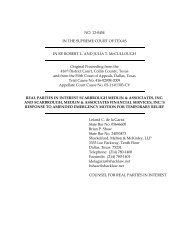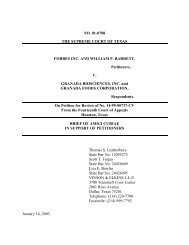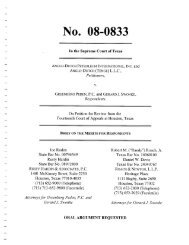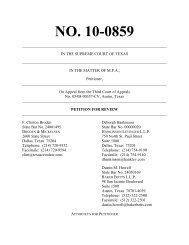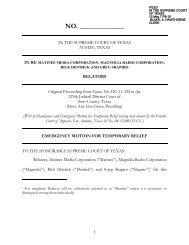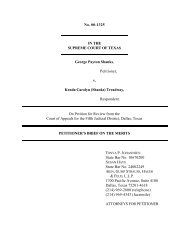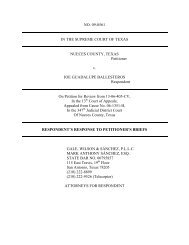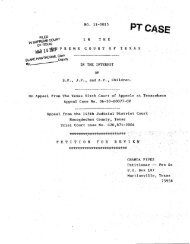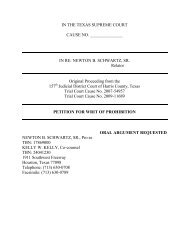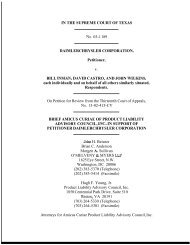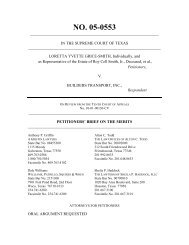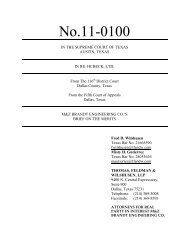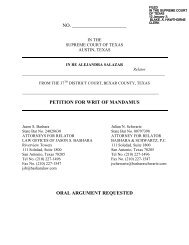Petition for Writ of Mandamus - Filed - Supreme Court of Texas
Petition for Writ of Mandamus - Filed - Supreme Court of Texas
Petition for Writ of Mandamus - Filed - Supreme Court of Texas
Create successful ePaper yourself
Turn your PDF publications into a flip-book with our unique Google optimized e-Paper software.
TAX CODE CHAPTER 171. FRANCHISE TAX<br />
http://www.statutes.legis.state.tx.us/Docs/TX/htm/TX.171.htm<br />
Page 41 <strong>of</strong> 88<br />
6/25/2012<br />
that cost on its federal income tax return or may expense those<br />
costs, except <strong>for</strong> costs excluded under Subsection (e), or in<br />
accordance with Subsections (c), (d), and (f). If the taxable entity<br />
elects to capitalize costs, it must capitalize each cost allowed under<br />
this section that it capitalized on its federal income tax return. If<br />
the taxable entity later elects to begin expensing a cost that may be<br />
allowed under this section as a cost <strong>of</strong> goods sold, the entity may not<br />
deduct any cost in ending inventory from a previous report. If the<br />
taxable entity elects to expense a cost <strong>of</strong> goods sold that may be<br />
allowed under this section, a cost incurred be<strong>for</strong>e the first day <strong>of</strong><br />
the period on which the report is based may not be subtracted as a<br />
cost <strong>of</strong> goods sold. If the taxable entity elects to expense a cost <strong>of</strong><br />
goods sold and later elects to capitalize that cost <strong>of</strong> goods sold, a<br />
cost expensed on a previous report may not be capitalized.<br />
(h) A taxable entity shall determine its cost <strong>of</strong> goods sold,<br />
except as otherwise provided by this section, in accordance with the<br />
methods used on the federal income tax return on which the report<br />
under this chapter is based. This subsection does not affect the type<br />
or category <strong>of</strong> cost <strong>of</strong> goods sold that may be subtracted under this<br />
section.<br />
(i) A taxable entity may make a subtraction under this section<br />
in relation to the cost <strong>of</strong> goods sold only if that entity owns the<br />
goods. The determination <strong>of</strong> whether a taxable entity is an owner is<br />
based on all <strong>of</strong> the facts and circumstances, including the various<br />
benefits and burdens <strong>of</strong> ownership vested with the taxable entity. A<br />
taxable entity furnishing labor or materials to a project <strong>for</strong> the<br />
construction, improvement, remodeling, repair, or industrial<br />
maintenance (as the term "maintenance" is defined in 34 T.A.C. Section<br />
3.357) <strong>of</strong> real property is considered to be an owner <strong>of</strong> that labor or<br />
materials and may include the costs, as allowed by this section, in<br />
the computation <strong>of</strong> cost <strong>of</strong> goods sold. Solely <strong>for</strong> purposes <strong>of</strong> this<br />
section, a taxable entity shall be treated as the owner <strong>of</strong> goods being<br />
manufactured or produced by the entity under a contract with the<br />
federal government, including any subcontracts that support a contract<br />
with the federal government, notwithstanding that the Federal<br />
Acquisition Regulation may require that title or risk <strong>of</strong> loss with<br />
respect to those goods be transferred to the federal government be<strong>for</strong>e<br />
the manufacture or production <strong>of</strong> those goods is complete.



